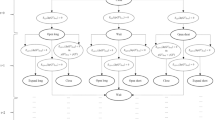Abstract
This paper examines the behavior of the regret-averse firm under exchange rate uncertainty. Regret-averse preferences are characterized by a modified utility function that includes disutility from having chosen ex-post suboptimal alternatives. We show that the conventional results that the firm optimally produces less, sells more domestically, and export less abroad under uncertainty than under certainty holds if the firm is not too regret-averse. Using a binary model wherein the random spot exchange rate can take on either a low value or a high value with positive probability, we show that the conventional results may not hold, particularly when the firm is sufficiently regret-averse and the low spot exchange rate is very likely to prevail.
Similar content being viewed by others
Notes
1 We assume that production takes place at home.
2 In our model, regret is driven by the lack of flexibility that the firm can react to new information, which is in stark contrast to the real options approach.
4 Our results also apply when the firm cannot sell domestically and has to export to the foreign country only, i.e., the firm is an exporting firm.
5 The strict convexity of the cost function reflects the fact that the firm’s production technology exhibits decreasing returns to scale. Our qualitative results remain intact if the firm can produce the commodity in both the home and foreign countries according to the respective deterministic cost functions.
7 Throughout the paper, random variables have a tilde (∼) while their realizations do not.
8 An alternative way to model the exchange rate uncertainty is to apply the concept of information systems that are conditional cumulative distribution functions over a set of signals imperfectly correlated with \(\tilde {S}\) (Broll et al. 2014).
9Braun and Muermann (2004) and Wong (2011, 2012) consider a regret function that depends on the difference between the utility level of the actual home currency profit and that of the maximum home currency profit, U(πmax)−U(π). Since such a specification is simply a monotonic transformation of ours, none of the qualitative results are affected if we adopt this alternative approach (see also Wong 2014).
References
Bell DE (1982) Regret in decision making under uncertainty. Oper Res 30:961–981
Bell DE (1983) Risk premiums for decision regret. Manag Sci 29:1156–1166
Braun M, Muermann A (2004) The impact of regret on the demand for insurance. J Risk Insur 71:737–767
Broll U, Eckwert B, Wong KP (2014) Transparency and risk sharing in international trade. The Manchester School, in press
Broll U, Welzel P, Wong KP (2009) Export and strategic currency hedging. Open Econ Rev 20:717–732
Broll U, Wong KP (2006) Multinationals, hedging, and capital structure under exchange rate uncertainty. Open Econ Rev 17:103–114
Broll U, Zilcha I (1992) Exchange rate uncertainty, futures markets and the multinational firm. Eur Econ Rev 36:815–826
Engel C, Rogers JH (1996) How wide is the border? Am Econ Rev 86:1112–1125
Engel C, Rogers JH (2001) Violating the law of one price: should we make a Federal case out of it? J Money Credit Bank 33:1–15
Fillat JL, Garetto S (2010) Risk, returns, and multinational production. Working paper, Department of Economics, Boston University
Klein MW, Shambaugh JC (2006) Fixed exchange rate and trade. J Int Econ 70:359–383
Loomes G (1988) Further evidence of the impact of regret and disappointment in choice under uncertainty. Economica 55:47–62
Loomes G, Starmer C, Sugden R (1992) Are preferences monotonic—testing some predictions of regret theory. Economica 59:17–33
Loomes G, Sugden R (1982) Regret theory: an alternative theory of rational choice under uncertainty. Econ J 92:805–824
Loomes G, Sugden R (1987) Testing for regret and disappointment in choice under uncertainty. Econ J 97:118–129
Mrázová M, Neary JP (2011) Selection effects with heterogeneous firms. Discussion paper no. 588, Department of Economics, University of Oxford
Paroush J, Venezia I (1979) On the theory of the competitive firm with a utility function defined on profits and regret. Eur Econ Rev 12:193–202
Parsley DC, Wei SJ (1996) Convergence to the law of one price without trade barriers or currency fluctuations. Q J Econ 111:1211–1236
Pflüger M, Russek S (2013) Business conditions and exit risk across countries. Open Econ Rev 24:963–976
Quiggin J (1994) Regret theory with general choice sets. J Risk Uncertain 8:153–165
Russ KN (2007) The endogeneity of the exchange rate as a determinant of FDI: a model of entry and multinational firms. J Int Econ 71:344–372
Sandmo A (1971) On the theory of the competitive firm under price uncertainty. Am Econ Rev 61:65–73
Schmitz M (2010) Financial markets and international risk sharing. Open Econ Rev 21:413–431
Starmer C, Sugden R (1993) Testing for juxtaposition and event-splitting effects. J Risk Uncertain 6:235–254
Steil B (1993) Corporate foreign exchange risk management: a study in decision making under uncertainty. J Behav Decis Mak 6:1–31
Sugden R (1993) An axiomatic foundation of regret. J Econ Theory 60:159–180
Wong KP (2011) Regret theory and the banking firm: the optimal bank interest margin. Econ Model 28:2483–2487
Wong KP (2012) Production and insurance under regret aversion. Econ Model 29:1154–1160
Wong KP (2014) Regret theory and the competitive firm. Econ Model 36:172–175
Author information
Authors and Affiliations
Corresponding author
Additional information
We would like to thank George Tavlas (the editor), Bernhard Eckwert, and two anonymous referees for their very helpful comments and suggestions.
Rights and permissions
About this article
Cite this article
Broll, U., Welzel, P. & Wong, K.P. Exchange Rate Risk and the Impact of Regret on Trade. Open Econ Rev 26, 109–119 (2015). https://doi.org/10.1007/s11079-014-9321-0
Published:
Issue Date:
DOI: https://doi.org/10.1007/s11079-014-9321-0



